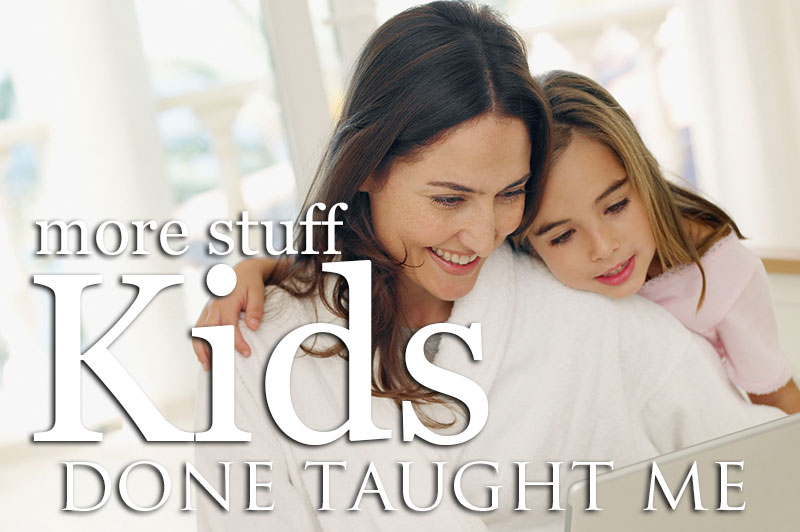More Stuff Kids Done Taught Me
Thrilled Parent: Watch Me Ace Raising a Child on My Own with No Rules!
A few years ago I had lunch with a beautiful and successful American woman in her mid thirties. Sooner or later the conversation got around - as it often does with me - to children. This woman told me that she had a five year old daughter. I asked her if it was difficult living and working in New York while raising a child on her own. She replied that it had been hard but that now it should get better since she and her little girl were going to parenting classes. `Parenting classes,' I asked, `whatever are they?' `You know, where you learn how to be a parent. We go twice a week together,' she reported with enthusiasm.
Curious about what was taught in these new programs, and at the same time suppressing a smile at the latest American attempt to package up something as rich and complex as parenthood and spoonfeed it to clients well-heeled enough to afford the indulgence, I asked, `What do they teach you?' `Oh, they teach you just everything’ she screeched, sweeping her hand across the table in a way that makes British head waiters loathe American clients. `For instance, when your child goes to pick up something from the coffee table which you don't want her to have you must never be negative,' she said.
`Negativity is not good for children,' she added, leaning closer in a conspiratorial fashion.
`So instead of saying, "No, no," which might crush your child's spirit, you say, "Now darling that is a no, but this is a yes (pointing to other objects near by), and this is a yes and this is a yes."'
OUT OF PATIENCE
I have little patience with such practices - nor do I believe there are a lot of set rules to follow to raise a child well. That is because, like a lot of seasoned parents, I have learned about parenthood the hard way.
When my first child was born—more than fifty years ago now—I was determined to bring him up right: not to make the mistakes that my parents had made with me, to ensure that he developed quickly both physically and mentally, and that he turned into the kind of person that I thought he should be. I worked hard at it. I read everything I could get my hands on about child development - all the latest theories and all the traditional wisdom. No time or expense was to be spared in bringing up this child. He would be breast-fed, disciplined, and taught to read by the time he was a year old using special equipment designed for the task. I would instill in him a strong sense of moral rectitude and good manners and he would be given every kind of educational toy I could lay my hands on to help develop his creativity. Also I would never lose my temper, always be patient and kind (but firm of course) and make sure he didn't watch too much television.
My master plan for child rearing might have sounded good on paper, but it had a couple of big drawbacks. First, no human being could ever have carried it out. Second, it completely ignored the most important truth there is about child rearing - a truth which I did not myself come to know until I had two or three more children under my belt. It is this: You don't have to read a thousand books and follow a lot of rules the so-called experts make up to raise a healthy, happy, creative child. You only need to learn to trust in yourself and in the incredible powers of Nature. You also need to develop the art of listening—with your heart and mind and instincts as well as your ears—to your child. Most of the time he will tell you what you need to know.
TO HELL WITH “PERFECT PARENTING”
Once I finally figured this out - many tried and failed strategies down the road - I let go of my anxieties and theories. Then motherhood became not only a joy for me but a source of never-ending wonder. I discovered that each child—not only my own children, but boys and girls with whom I worked as a nursery school teacher, and others—is utterly unique and perfect in his or her own way. I also learned that your relationship to a child has a life of its own. So long as you are willing to face each child honestly and openly day by day and so long as you honor and respect this relationship, not only does this empower you to give the best guidance and care for the child. In some magic way which I still don't fully understand, it can even help heal deep emotional wounds within you yourself as a learning parent.
Most important of all I discovered that the whole idea of perfect parenthood is a big fraud. There ain't nothing perfect when it comes to parenthood. Perfect by whose criteria anyway? The sooner you accept this fact, the sooner you can get down to the business of child rearing and enjoying it.
For me, raising children—whether it be dealing with a tiny baby or seeing your twenty-five year old develop year by year—has been the most exciting and rewarding thing I have ever done—or for that matter, ever hope to do. And as for the widespread belief that unless you have been well mothered while you were growing up you are doomed to be a bad mother yourself. It just ain’t so—no matter what those high falutin’ experts keep sayin’.
